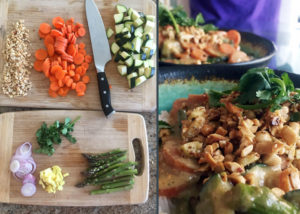
Joelle asks:
I own a home outright on the West Coast. I’m thinking about taking out $100,000 from my home equity, and using this money to buy a rental property.
I found a community out east where I can buy a property outright in cash for $100,000 in a good neighborhood. Should I pay cash for one house (via the home equity loan)? Or should I split this $100,000 into multiple down payments on many homes?
Yasin asks:
My wife and I are living on one income and investing the other. We save $60,000 per year. We’re looking at duplexes in Minnesota that cost $160,000 to $180,000. Our plan is to purchase a duplex, move into one unit, rent out the other, and aggressively pay off the mortgage in about 1.5 years. We’d move out and repeat this process until we have $7,000 per month in passive income, at which point we’d be financially independent.
Should we pursue this plan? Or should are we playing it too safe? Should we buy more properties upfront, rather than waiting for two years between each purchase?
Anonymous asks:
I own four rental properties, each of which have an average rent of $1,350 per month. I purchased all of my properties within the past 24 months, and each one has been recently renovated. My goal is to own 20 rental properties.
I’d like to make sure that I have adequate cash reserves, in case of emergencies. Each of my properties have insurance with a $5,000 deductible.
How much money should I keep in cash reserves? What factors should I consider?
Kim asks:
I own one rental property. I recently moved into a single-family home in Scottsdale, Arizona, with the intention to live here for one year and then make this my second rental property.
My mortgage is $1,500 per month, and I could collect rent of $2,250 per month – or more, if I Airbnb it. The neighborhood is booming; the housing here is appreciating at an astronomical rate.
However, I’m concerned about the longevity of the plumbing in my current home, which was built in 1960s. I may have an expensive repair on the horizon.
Here’s my question: Should I hold onto this property, despite the looming repair bills, and turn this into my second rental property?
Or should I live in this home for two years and then sell it, cash out, and repay all my student loan and consumer debt? I hold a $60,000 student loan, $7,000 in vehicle loans, and $5,000 on a credit card. My goal to own many cash-flowing properties.
Anonymous #2 asks:
A year ago, I relocated to Silicon Valley. I’m thinking about buying a townhouse-condo hybrid. I like the neighborhood and it suits my family’s needs.
The property will become a rental in 5-7 years. It’s in a distressed area and could see a lot of potential appreciation.
What loan should I consider, given that this property will become a rental within 5-7 years? I’m debating between a 7/1 ARM or a 30-year fixed rate mortgage.
Also, should I redirect most of my income to paying off the principal as quickly as possible? There are two schools of thought on this: (1) build equity and use a HELOC to buy another property in 5-7 years, or (2) make only the minimum payments on your mortgage. What do you think?
Tune in for the answers!
P.S. Need software to manage your rental properties? Collect applications, screen tenants, and collect rent online with Cozy.co/Paula.
Resources Mentioned:
- How to Calculate Cap Rate – Afford Anything article
Thanks to our sponsors!
Are you getting the most out of your bank? If your bank isn’t making you money or providing an incentive for your business, it’s time to find one that will.
Thankfully, GOBankingRates is back for the sixth year in a row with their Best Banks rankings, with categories such as Best Online Bank, Best Checking Account, and 10 Editor’s Picks.
To find your best bank, visit gobankingrates.com/paula.
Do you spend more money at restaurants (or ordering take-out) than you’d like?
If so, check out Blue Apron. For less than $10 per person per meal, Blue Apron delivers seasonal recipes along with pre-portioned ingredients to make delicious, home-cooked meals.
Give them a try and get $30 off your first order— with free shipping — at BlueApron.com/afford.
Save time by using Freshbooks, an easy-to-use, cloud-based accounting system that takes the stress and hassle out of bookkeeping and, especially, invoicing. You can create an invoice in a few seconds, and Freshbooks’ automated system will handle the rest. They’ll help you get paid faster, with less hassle.
Wanna try them for free?
Visit Freshbooks.com/paula for a free 30-day trial. Please mention this show when they ask how you heard about them.
